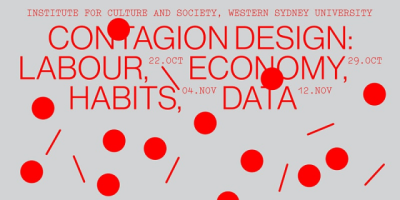Contagious Mutualities

The recent online International Contagion Design Symposium featured four Community Economies Research Network (CERN) members from Australia, Britain and Europe who presented papers in a session on Contagious Mutualities.
In his co-presentation with Declan Kuch, Stephen Healy from Western Sydney University highlighted how growing food insecurity during the COVID-19 pandemic has been responded to through social innovations by food banks and other and non-profits and social enterprises that have focused on getting food to people by building on existing practices of mutuality.
Related to the theme of practices of mutuality that have come to the fore during COVID, Declan Kuch, from Western Sydney University, discussed how the design of cities based on the movement of cars has been disrupted and how this has opened up opportunities for new forms of mutuality such as GoGet and other car sharing initiatives.
Kuch also highlighted how long-standing mutual organisations such as the NSW Road Motoring Association (NRMA), which are often presumed to be synonymous with petrol-based individual car ownership, can play a role in promoting shifts in transportation as seen in the NRMA’s commitment to support the growth in use of electric vehicles by expanding its electric vehicle fast charging network.
Pete North, from the University of Liverpool in the UK, explained how Liverpool, based on its history of being an outward-facing seaport, has a legacy of community diversity and political struggle which has come to the fore in the current period with community-based groups and organisations providing support for those hard hit by the pandemic and also networking to support the efforts of other groups and organisations.
North’s understanding of the economic history and diversity of the Liverpool area has informed the policy briefing, Building Back Better: What Role for the Liverpool City Region Economic Recovery Panel?, he has prepared on post-COVID-19 economic recovery, an initiative that was run through the Heseltine Institute for Public Policy, Practice and Place for the Liverpool City Region Economic Recovery Panel.
North added "While the mutual aid and social enterprise that has helped people though the immediate crisis is heart-warming - and it is good to know that it is there when you look for it - there is also a growing generative anger at the entrenched structural inequality between the south and north of England that the pandemic has revealed."
"It is not yet clear the extent that the pandemic will act as a 'mobilising event' facilitating the emergence of changes commensurate with meeting the need that has been revealed, really 'building back better', which would require the types of social democratic action at the state level such as that outlined by Teppo Eskelin (see below). We know what is wrong, but perhaps we don't yet have enough convincing alternatives to counter hopes for a return to the old normal once the pestilence has passed."
Teppo Eskelinen, from the University of Jyväskylä in Eastern Finland, drew on his research into Nordic welfare states to explain how the COVID crisis has highlighted the importance of serving the public good, thereby furthering the potential for these welfare states to provide the enabling conditions that would deepen economic practices based on an ethos of mutualism.
Eskelinen’s presentation built on his 2020 co-edited collection, Enacting Community Economies Within a Welfare State, and his chapter on the emphasis in community economies on seeing value in social interaction, community, self-organisation and empowerment, and the potential for welfare states to not just support these community economic practices but to integrate them more strongly into how they operate.
The Contagious Mutualities session was organised by Stephen Healy, and the overall Contagion Design Symposium was co-organised by CERN member Gay Hawkins and run by the Institute for Culture and Society at Western Sydney University. The remaining two symposium events are on 4 and 12 November 2020.
Katherine Gibson and Jenny Cameron
Image by Public Office
